— The Memory of a Deluge and the Surface of Water
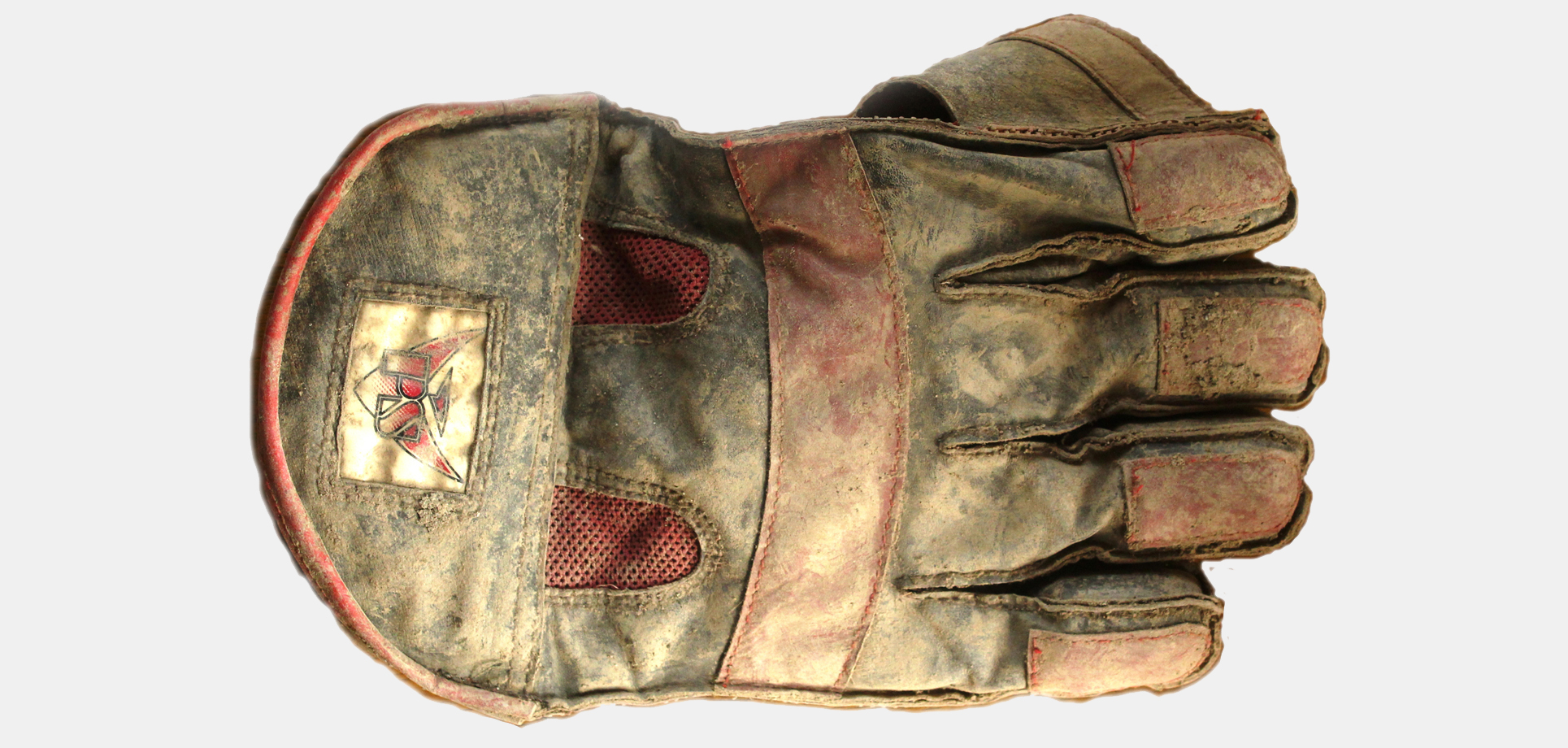
It rained heavily in the old days. Last year it also rained, heavily. The clouds whispered, then burst, then whispered. They whispered and thundered about the daev, the demons descending from the sky—demons wet with heavy rain. What was it that the demons wished for as they rained? Was it deluge, again?
The deluge of September 2014 wreaked havoc in the valley of Kashmir. It besieged the homes of people, drowned the hearts of lovers, stormed the minds of poets, assaulted everything every day as the waters rose. The memory of rising water remains embedded in everyone's memory in Kashmir, and it has become impossible to forget or overcome. Water remained inside most areas for twenty-five odd days. The art college in Srinagar was not spared. The water demons occupied the building, inundating everything.
The hands of every clock were stuck at seven fifty, as if forever. Walls were eaten by damp. Time, having escaped from every canvas on the walls of the art college, stopped. Even the memory of music was smeared with mud and solitude. The blades of grass in the ground became ghosts and turned invisible. Everything was wet, and once it dried, dusty. Only the fish in the aquarium survived.
In Kashmir, we are used to drowning, to disappearing. But this destruction brought in its wake its own special despair. It emerged when the dilapidated remains of the college’s work spaces became visible in the aftermath of the deluge, when everyone got a sense of the sheer scale of the destruction of the students’ works. Nothing remained untouched by the water demons.
It was as if the momentum of life had taken a hit, a bad one. But still it had not been washed away entirely. The color of diagonals, the textures of paper, the gravity of form had not altered unrecognizably, at least not for everyone. On a not-so-warm autumn day when the waters had receded a little, a mild sun reappeared, and with it some new beginnings became visible.
The puddles had shrunk, but had not yet evaporated. The water-demons were isolated, not gone. The green algae spread everywhere, adding a dank, musty smell to everything. The city stank differently now.
In the swamps, which had once been streets, there were remains. These residues of things, of thingness itself, enjoyed the first rays of sunshine after the deluge. Things abandoned by the wayside took on new lives, free of ownership, but still clinging to the memory of having once been belongings.
But the rains came back, and with their return, the remaining threads of association that had clothed objects abandoned on the streets were washed away from memory. The water demons, dwarves now, danced. Bereft of ownership and custody, things that had lost names and titles now transformed into signs waiting to be invited into a newly rejuvenated vocabulary. They evolved into new things with new lives, new memories, new associations, new experiences—even with new forms of existence.
It was as if the occupation of the valley by the water demons had momentarily freed the things, the signs of life on the streets, from the harsh memory of other occupations. It was as if the objects, relics now, had begun to absorb the strength that “unoccupied life” hides within itself. Strengthened, emboldened, they began a dialogue with history, with fiction, with memories, myths, and legends. There is nothing strange about that.
This is what we celebrate here, in these short texts that the students of the art college at Srinagar wrote, invented, and performed after they left the flood in Kashmir behind them. For many months they traveled with images of objects that had emerged from the floodwaters in Kashmir. These images and memories of what the floodwaters left in their wake became anchors for their practice, their education, their future as artists. They traveled to Kochi in Kerala, thousands of miles to the south of Kashmir; they traveled to Shantiniketan in Bengal, to Delhi. Wherever they went, they told the stories of the things that had stirred to new life after the flood. These are the traces of some of those stories.
These days, while walking on the new Zero Bridge in Srinagar, one beholds and witnesses all the destinies that the river holds in its waters. The water in the river flows tranquil now, as if it had never been a bank-breaching monster that challenged everything and everyone. Under the shade of the bridge, the memory of the deluge and the surface of the water flow into one another. In the distance the sky turns crimson in awe.
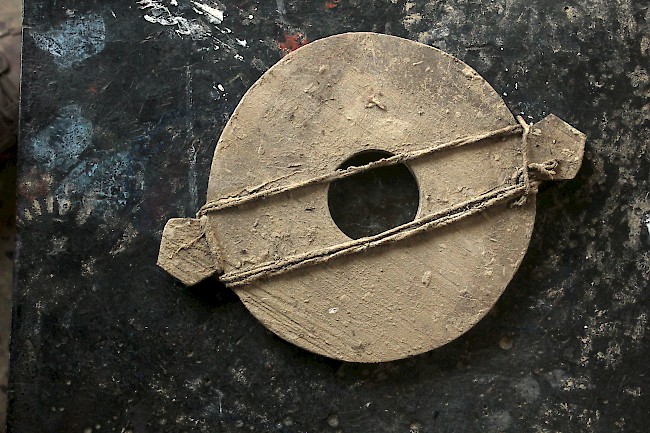
Sitari—Wathoori
Khurshid Mushtaq Ali
Ameer Khusro’s sitar is an iconic musical instrument. It is because of this sitar that he was known as the pioneer of Sufi music in Hindostan. Once Ameer Khusro fell ill. His grandmother took him to a saint for a cure. The saint beat him with a sacred rope and Khusro got healthy within some time.
Khusro had a great ability to listen, right from the time of his birth. He could hear even those details of rhythm and sound that a common pair of ears would ignore or not even notice. But he fell ill again, and again his grandmother took him to the saint. The saint beat him like the last time, but also gave him a toy, a toy stringed instrument. Khusroo would play this. He transformed the toy into a sitar; he learnt every note, every chord. He dived so deep into the music that he became a saint of music. It was all because of the power that he brought to the act of listening.
He heard of a symphony and came to Kashmir with his sitar to look for it. He learned that symphony from the people of Kashmir and also taught them some of his own ragas in return. At last he had to go back home. He forgot his sitar here in Kashmir. His students preserved it, thinking that this was deliberate forgetfulness on the part of a mystic. They, my family, kept the sitar. Over time it acquired the statues of a relic within our family.
There is a tradition in our family that on the seventh day after the birth of a child Amir Khusro's sitar is played near the right ear of the newborn. As fate would have it, when I was born my family was preparing for the musical ceremony on the seventh day, as per tradition. They found that one the strings of the instrument had come loose. But they didn’t take this as any kind of a bad omen and went ahead and played it near my right ear.
As time passed and I started growing up I had difficulty stringing words together. At first my people said that this was something I would overcome, as some kids do take more time to come up with full words and sentences. But in my case it was becoming more and more difficult for me to speak.
Now I stammer. Gradually my family understood the mistake that they had made during the musical ceremony on the seventh day of my life.
I too grew up hearing about the loose string and my birth ceremony. So whenever I had time I would sneak out to seek the sitar in my house. I tried to play it many times. To my surprise, it would never make any music.
Now I think of presenting the same musical instrument as a portrait of myself. As part of my being.
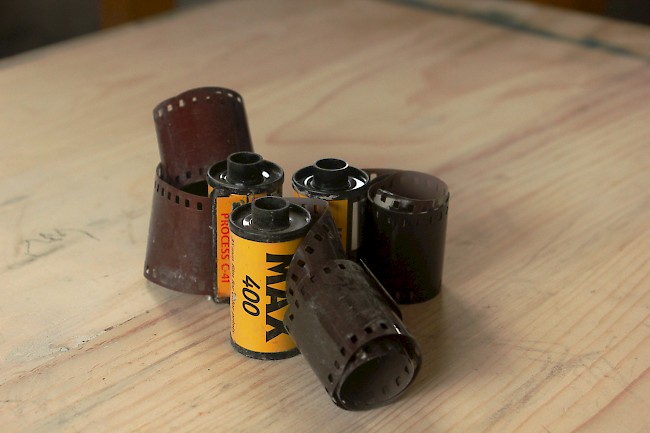
Reels of Kalashnikov
Saqib Bhat
A boy living somewhere between Afghanistan and Utopia had a habit of catching wingless butterflies using his fish net. He used to turn butterflies into fireballs and blow up the flowers, leaving other butterflies with nothing to sit on. One day the butterflies sought to take revenge and went to a bazaar of insects that sold items no one could imagine. The butterflies wanted to buy Kalashnikovs and thought of photographing the boy. The Kalashnikovs would turn everything they photographed into a photograph itself.
But they changed their mind and they sought to take his case to the UYES, who were the opponents of UNO. To reach to the UYES, the butterflies had to break through a wall that could only be broken by a needle. UYES decided the case in favor of the boy. Angered, the butterflies took a Kalashnikov and shot the boy and turned him into a photograph. As soon as the Taliban heard of this special weapon they kidnapped the butterflies and took away the weapon.
Later on, the weapon was stolen from the Taliban by a shoal of fishes who were infiltrating Kashmir before being caught by the army. The Kalashnikov was found by a local boy, who coincidentally happened to be my brother. He took it home and extracted the reels from inside the weapon. As soon I realized what was happening (for I had read all the books Angel Gabriel had written during his leisure time on Sunday evenings) I had to kill my own brother in order to possess the reels, in order to maintain balance in all the eleven dimensions.
Video Tape/Only Proof of God’s existence
Saqib Bhat
This videotape carries evidence of the existence of God. One of the defecting angles of heaven filmed God as he watched the world go by. The angel sought to put together evidence to convince one of his devout followers back on Earth that God actually exists. Conventional beliefs ordain humans to believe in God on account of his creations alone without anyone having actually ever seen him. But acting against God’s will, the angel ended up committing a holy sacrilege that he would later pay for. Angered that he had betrayed his will right under his nose, God punished him with a lifelong exile on Earth and disposed of the tape.
The tape fell over the dark clouds that rained heavily over Kashmir. Swept away by a torrent of water, the tape traveled all the way to Sonwar and that is where it was retrieved by me. Since floodwaters impaired the tape, I was unable to access the data and therefore the only visible evidence of God's existence remains unknown to me.
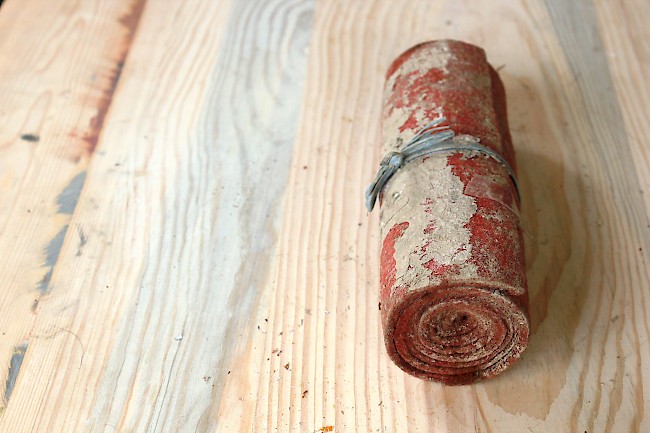
The Rescuer
Bushra Mir
I was always fascinated by Aladdin and his magic carpet. I would always wonder if I would ever be able to meet Aladdin. My sister said she was friends with him, but I didn’t believe her.
But then, when we were stuck in the flood, something happened, something extraordinary. Aladdin came by our house with his magic carpet. He saved us. I was relieved and excited at the same time. Later, when he was about to leave, he called me and my sister and gifted us the magic carpet. We were so thankful. With the help of the carpet, we helped a lot of people. We rescued them and took them to safer destinations.
All hailed Aladdin and his magic carpet. And now, the government too is willing to hire him for the National Disaster Relief Force Team.
Regal Shoes
Irfan Butt
These magic shoes belong to an important princess. They used to beautify her feet. She got adorable shoes from her mother, the queen, as that was the tradition for ages. Whoever in an ancestral lineage wore the shoes became a king or queen. In the end these shoes came down to the princess Noorjehan when my grandfather was working in her palace.
My grandfather was an important servant in that palace. One day my grandfather saw those shoes and wore them and immediately he became a prince. Then the princess and my grandfather, now a prince, were married. One day another servant who was working in the palace stole the shoes and ran away from Kashmir. We got to know that he had built a palace and become a prince.
One day I had to leave for New Delhi to attend an art exhibition where I got an award for my work and the trophy was the same pair of shoes. I lost one of the shoes in the flood of Kashmir.
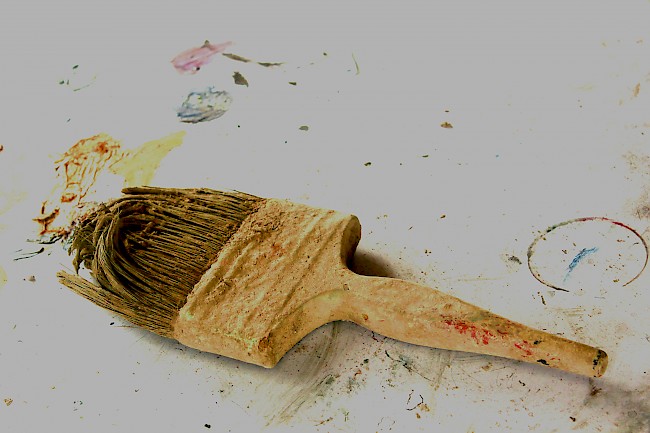
Minimalist’s Brush
Irfan Butt
Once there was an international artists workshop. Around five hundred artists from around the world participated. The workshop was held for a year. All the artists were working very hard, and their works were coming out well. But there was one artist who did not complete his work until the end. He did not care for it much, but when the artist took out his brush, the canvas filled with the work in no time. Everybody was amazed; the lazy artist became all the rage. One day a workshop was announced in Kashmir in which that lazy artist participated. I was selected for that workshop. In the workshop the same thing happened—his canvas filled with work. That lazy guy liked my work. He became my friend and gifted me that brush.
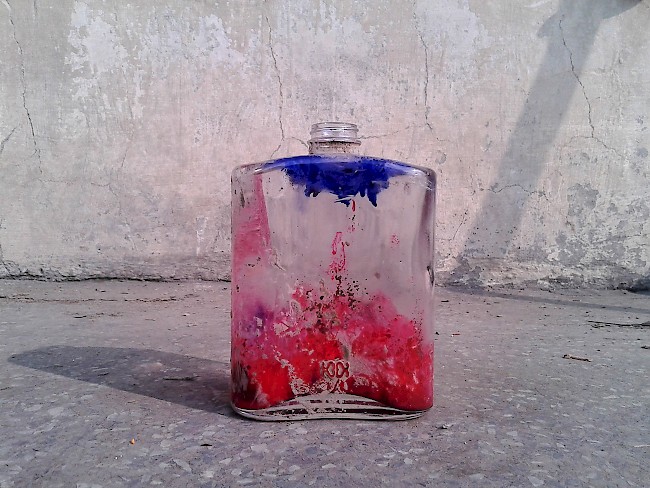
Ambrosia
M. Sayeed Teli
One day I was very sad. My grandmother asked me why I was sad. She said, “Come with me my son, I will tell you a story.” She said that my great-grandfather had a brother whose name was “Nebre.”
One day Nebre left his home because he wanted to become immortal. He left his home and came back after seventy years. He laughed and cried, saying, “I will never die, I will never die.” But no one took him seriously.
My grandma told me that once when she was alone at home, somebody knocked on the door at midnight. When she opened the door, she saw it was Nebre.
“I am Nebre, believe me, my father’s name was Ghulam jinn. I had three children and I know you are my great-granddaughter. Your name is Khurshe."
Nebre said that he would give her a gift. That if she drank it she would never die. He said it was ambrosia—a gift from the Greek gods. Grandmother asked him where he had got it.
This is what Nebre said:
"When I left home first time I went to Pandrethan. There was a cave. I went inside the cave and saw a man. I asked the man who he was. He said, “I am God, my name is Zeus.” He handed me a bottle and said, “Whenever you feel you are about to die, take a sip from this bottle." I took a sip from the bottle.
“When I returned home after seventy years, crying that I am alive, no one believed me. I left home again and I met Zeus again and he told me that I should hand the bottle over to the person who was dearest to me. And this is the reason why I am here tonight. You are dearest to me. But you will have to promise me that you will do the same to this holy water, hand it over to the person who is dearest to you. "
As I grew older, I forgot the whole incident. Once I fell ill. When I slept, I dreamt of that incident. I mixed some sleeping pills in a glass of juice. I gave her the juice to drink.
That night, I woke up at midnight, painted myself black, and went to her room. I broke the lock and stole the bottle. Next morning, I went to Srinagar. On the fifth of September, I slept at night in my rented room in Srinagar. In the middle of the night, I heard some noises in my neighborhood. The Jhelum River was rising very fast. I had to leave my room because it was located near the riverbank. I took my bag, in which I had kept the bottle, and left for a safer place. I realized that my bag had been torn, and the bottle had fallen somewhere. After the flood, I went to see my room, and I found the bottle there. But alas, it was empty.
The Sickle of Attila the Hun
Muhammad Younis
Legend says that he used to work as a blacksmith. That he made sickles. His real name was Qadir Kaak. He suffered from complications due to his anger. Legend says he was a disciple of Abdi Ood, that he was born in Kashmir and that he died in Kashmir, overdosing on opium. Attila was gifted with such talent in the making of sickles. His wonderful and efficient sickles were known throughout Kashmir.
Attila was very fond of experimenting with heart surgery. Once he performed open-heart surgery on a goat. And then the goat became immortal. For this surgery he was awarded an Oscar. After a few months he went to America, where he met Michael Jackson, who helped him to sharpen the sickle by doing a moonwalk on the blade of the sickle. Then Michael Jackson became white and Attila turned black. This was all due to the charm of the sickle that he took along with him to America from Kashmir. The material from which the sickle was made came from the planet Krypton and was brought to Earth by Hanuman the monkey god. Then this sickle was kept in the Louvre museum. And from there it was stolen by Karl Marx, which forced the allies to attack him. Karl Marx hid himself in Kashmir, in my area, Charar-E-Shareef, where he died by eating an excess of lotus flowers. Before his death he gave this sickle to me.
Applica
Mir Mehmood
Once upon a time, there was a small village, which was known as Applica. The fascinating thing about this village was that everything in this village was immortal. Trees, birds, humans, even fruit—everything was immortal. Once, the soul of an apple desired to leave its body. When the news spread in the village the other apples started to build a beautiful coffin for this apple.
Many apples participated in building the coffin. At last they succeeded and the coffin was ready for the apple that desired to leave its body forever.
Now, after 40,000 years, this coffin and the apple floated by my house in the floods. It came to my house from my ancestor’s village—Applica.
Measuring Tape
Mir Mehmood
One day, sometime around 800 BCE, I was out walking with my best friend, the Pied Piper of Moscow. On the street down which both of us were walking, there was a beautiful lady. She stood staring at us. After a while she smiled and came to me. She kissed me and took a measuring tape out of her bag. She told me, “Keep this with you wherever you go, it will keep my remembrance in your heart.”
She added that it was with this measuring tape that she had measured the length of world. Really! Really, she was a real carpenter’s daughter who loved me a lot!
The Magic Box
Maria Fayaz
It was the most boring day in the school holidays that year. All my other friends were either camping or shopping. I groaned with jealousy. Instead of being somewhere exciting, I was stuck at home, alone. I was sitting uncomfortably on the red, soft couch. I got up and walked around the room in a little circle, still as bored as ever. Suddenly, I spied the small attic door near the staircase. Dad and mum don’t let me go in there much. I strolled over and tightened my hand around the doorknob. It did not open. I yanked it once more and finally it opened. I put my head around the corner, taking in all that there was to see. I saw some clothes from my babyhood in a bigger box, but instead of opening the box, I saw my hands going for a smaller box near the bigger one. It was fully transparent, with a few dusty spots spotted all over it. I pressed it into my arms and ran out of the attic. I blew away the dust from the box. But it came to me in shock that there was nothing to be seen inside. I sighed, disappointed. I growled, "Why can’t you just be a magical box for me? I wish you could give me chocolates, cupcakes, puff corns."
Suddenly it was as if magic happened, I saw all those things around me. Yummy! Great happiness flooded over me, and I realized this box was magical. I couldn’t wait to show it off to my friends. I looked out of the window and listened to the rain, to the dull, boring rain. The kind of rain that always destroys anything you want to do outside. I was lonely. I had no one to play with. Suddenly an idea popped into my head and I looked at the magic box and said, "I wish I had two dogs." I watched in surprise as two barking dogs came from the main door. I was scared of what my mum would say. I looked at the box and I wished the dogs were gone. The dogs were gone! I threw the box back into the attic, closing the door just in time to see mum standing beside me. After a day I looked in towards the spot I threw the box. I searched everywhere, but it wasn’t there. Now, it’s surprised me again. Because it’s here, left behind by the floodwaters.
Sand Glass
Maria Fayaz
This sand glass was used by the pirates of the Jhelum to preserve sand, for there was no land here in Kashmir. Dust and sand were thought to be more precious than gold. My family is descended from the pirates of the Jhelum. I read in the old chronicles that this sand glass was gifted to my family.
It was also used for measuring speed. This is how it was done: A long line in which knots had been tied at regular intervals was thrown overboard. By counting how fast the knots appeared, they could reckon how many knots or nautical miles an hour the ship traveled. The sand glass was calibrated in seconds, minutes, and hours. The half hour sand glass was carefully tended. It would be turned as soon as the sand had run though the half-hour mark and then a bell would be struck for all aboard to hear. Likewise, at the end of four hours, when the sand had run through the four-hour mark, the glass was turned again.
One day I was playing with my cousins near a shipwreck that had crashed in our garden a hundred years ago. As I walked through the broken deck I came across stairs that led me inside the ship. I went in; the darkness led to a secret passage. And the secret passage let me reach into the land of the dead!
I was frightened when I read the sign saying “Welcome to the Land of Dead”; nervous. I saw a casino with a sign saying “Play Blackjack for eternity.” I entered the casino; the waitress brought me the vomit of a unicorn to drink. It was said that drinking this would to accelerate one's metabolism by 200 percent. I took the glass, ran out from there, went to a crowded street where two dead people were playing chess. The older dead man looked at me, stared at me for some time and said, "I am your dead blood, the first pirate of your family." He hugged me tight with his ribs and said, “The prophecy is real.” He gave me the sand glass and said “Captain.”
“Captain. Captain.”
I woke up. My cousin was yelling at me. I got up, cleaned my skirt, and realized I had this sandglass in my hand.
The Early Messenger
Sumaira Majeed
A hundred years ago, my grandfather gave me a very precious gift. He gave me a phone that can perform some really extraordinary functions. It also works like a remote. It was gifted to me on my birthday a year before I was born. It can beat any phone, even today. It needs no charging, has no wires for headphones. And the most interesting thing about it is that I can talk to people who’ve left this world, without knowing their phone numbers. Guess how..??? My phone and my ancestors belong to the same time. So there must be some connections—heart to heart connections, don't you think so? Sometimes, I talk to Picasso, to van Gogh, and to Michelangelo. The artists keep talking about IMFA. They keep asking about the system here, the trainers, and even about the time they’ve spent in IMFA.
Last month, I received a message from my grandfather. Before I could open it, the cells turned dead. Next day, the Jhelum River level rose, and this was accompanied by devastating floods. After some days, normalcy returned and I read the message from my grandfather. It read, “How are you my beloved koori? I somewhere learned that some gushing waters are proceeding towards your city. Take care. Be safe.” On aasmaan-sky-chat I replied, “Dear totha, I am fine. Please tell me whether you are talking about the previous floods or is there anything yet to come.” He replied: “It was just a trailer. Picture abhi baaki hai mere dost. The real movie is yet to come!!!”
A Kangri Full of Diamonds
Zaid Mehraj
During the close of the eighteenth century, when Kashmir was under Afghan rule, the shawl industry thrived. The market for Kashmiri shawls extending as far as Turkey. A Kashmiri shawl made its way even into the hands of Napoleon in 1796. His wife Joséphine was immensely pleased with it. She set a new trend in fashion not only in Paris but also in the rest of Europe. By 1800 AD the shawl trade between Kashmir and the West was well established. During this era my great-great-great-grandfather gifted a kangri to Joséphine as a mark of respect.1 A kangri is a personal, portable heater, a small clay pot full of live coal that is worn under long woolen coats during the bitter cold of the Kashmiri winter.It was a custom here in Kashmir to give a kangri or a shawl to a newly wedded bride for her first winter. But it wasn't Joséphine's first winter. So she refused to accept this kangri and sent it back, not empty, but filled with gems and diamonds.
Time passed. One day some thieves came to our house and stole all the diamonds. They left the kangri behind. It has been with us since then. At home we still call it the kangri full of diamonds.
The Stolen Number Plates
Zaid Mehraj
Once upon a time Alexander The Great visited Kashmir on a horse. No, it wasn't a brand-new horse. It was a horse stolen from that market in Delhi (Why should I tell you the name?) where used things are sold at throwaway prices. These are the horse's number plates. Yes, they are fake. Alexander the Great gave the horse to my great-great-grandfather who was a brand ambassador of POLO. (Not POLO USA but POLO KASH).
Now my grandfather (son of my great-great-grandfather) was a very mischievous kid. He stole these plates so that he could use them as skis in snow. Well, he was not so good at this job. One day he fell and got a fracture and these plates have remained there since then. Snowflakes fell on them that winter ...
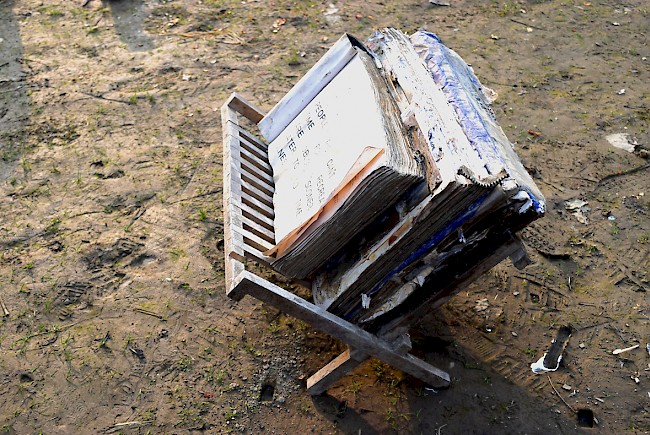
The Book and The Shelf
Zaid Mehraj
This is a story about two friends born in a village along the banks of river Nile. They went to school, played, ate, and did everything together. Time passed happily. All the villagers were impressed by their friendship. But one day, unfortunately, drought came to that village. They were 432 years old then and still kids at that time.
As the chief of the village was very experienced, being about 2,344 years old, everybody in the village listened to him.
The chief gave people the order to slaughter their dinos (cattle) as a sacrifice for the river Nile, so that water would flow again in the dead river. But nothing went right. Days passed and people died. Only vey few remained alive, and amongst them were the two friends. Being intelligent and adventurous by nature, the two friends looked hard for a way out. One day they found a bottle of water. But they didn’t drink it and went instead to the village to look for other people who were still alive. Since they didn’t drink the water they died of thirst. For this heroic deed, God blessed them with eternity, and their bodies were transformed into this book and this shelf.
After some time there was a flood in the great Nile. It is said that half the world was submerged in that flood. It was the time when my great-granduncle went for the holy pilgrimage to Mecca. While traveling from Mecca to Madina he lost his way in the desert. After walking for few days he met a shepherd. When my great-granduncle told him about his ordeal the shepherd gave him his camel and told him that this camel knew the way to Madina. Having no other option in the middle of the desert my great-granduncle took the camel and continued his journey.
During his journey on the camel he felt there was something stashed inside the bag, which was hanging on the left side of the camel. When he opened it he found The Book and The Shelf.
After returning from the holy pilgrimage he handed these books to my father before he died. My father found the story of two boys written in golden ink in the book.
Space Ship
Suhail Ahmad Sofi
One day, a spaceship landed in our yard. Some people came out of the spaceship and started moving around. The very moment that I saw that they had left the spaceship, I stole it and hid it in my home. When they came back, they wondered where the spaceship was. I told the space travelers that a thief had stolen the spaceship. They were surprised and then they started wandering by foot. Then, I took the spaceship and started enjoying rides on the spaceship. One day I lost my way and reached Afghanistan. In Afghanistan I took a cup of tea. Then I left Afghanistan and moved towards America and had lunch there. From America I came back to Pahalgam in Kashmir. There I met with my friend Innaam ul Huq. I told him about my travels. It got late but we enjoyed the conversation. Then I dropped off my friend where he lived. Then I left for my home. After a hectic but fun-filled day of spaceship rides, I packed the spaceship in my locker and went to bed.
Two Horns
Suhail Ahmad Sofi
My grandfather had an auto-rickshaw. It had two horns. Every morning I would get into the auto and enjoy blowing the horns.
My grandfather took me to school every day in his auto and I blew horns all the way to school. Sometimes I got so carried away blowing the horns that I would even miss school. Sometimes my grandfather would get angry with me and would scold me for blowing the horns way too much.
When my grandfather died everyone in the family wept with grief and sorrow but I was still in the auto blowing the horns. Finally, my family decided to sell grandfather's auto. But before we lost the auto, I took out both the horns. And I played them for a long time. In the end I decided to give the two horns to my niece. After me, now she plays the horns.
Puppets
Rufsa Bashir
There was a magician named Rafwa. One day he lost his magic wand, thereafter he used these puppets to do magic. Once I met him, I came to know that he had lost his magic wand. I decided to help him. I searched for it across the entire country; I found it in the hand of a monkey. I gave a banana to the monkey and asked him for the wand. Then I returned to the place where the magician lived and told him that I had found his wand. Then he gifted me these puppets, since then they were with me.
The Gift
Noorul Ain
Today I am surprised. When I saw that picture in my garden, about which grandfather told me in my childhood. In this picture are my grandfather and Sai Baba. In my childhood grandfather always told me about Sai Baba. At that time my grandfather was working in an ashram. Fortunately Sai Baba also came to the ashram and they became friends. They worked together in the ashram for a long time and sometimes he also came to our home. Lastly they captured a picture for their memory of friendship. I have never seen this picture when my grandfather told me about his friendship because this picture was at Sai Baba’s possession. Now due to the flood I found this picture in my garden. When Sai Baba left Kashmir they gave him a gift for a sweet memory of his friendship. Last time I saw my grandfather he gave me this gift that Sai Baba gave him for his memory. Now I am lucky that both the gifts of my grandfather are with me.
Diamond Ring
Mehnaz Gani
One day my mom handed me a leopard cub, and when I saw what was it wearing, I started wondering. On its left front paw it was wearing a hundred-year-old diamond ring. My pet dragon had worn this ring when she got married to my father. Either it belonged to my paternal great-dragon-mother or perhaps a great-dragon-aunt. I couldn’t stop looking at it.
And I wanted to wear this ring. I thought of replacing the ring with an artificial ring of my own, of stealing the diamond ring and wearing it in on my finger.
But few days ago, I lost the ring. I felt very sick and sad and even somewhat betrayed by myself because I hadn't taken better care of the ring. My skin started to peel off and I started to turn into a dragon. I searched all over the house and could not find it. I spent the entire afternoon crying like a baby. I was crushed and horrified and felt like the biggest idiot in the world. When I dropped my head in despair, I saw it on the floor. Yes ,I found my ring. I screamed and ran around the place and wore it again. It is absolutely euphoric. My skin grew back again and I found back my human form!
×
All images courtesy of the author.


